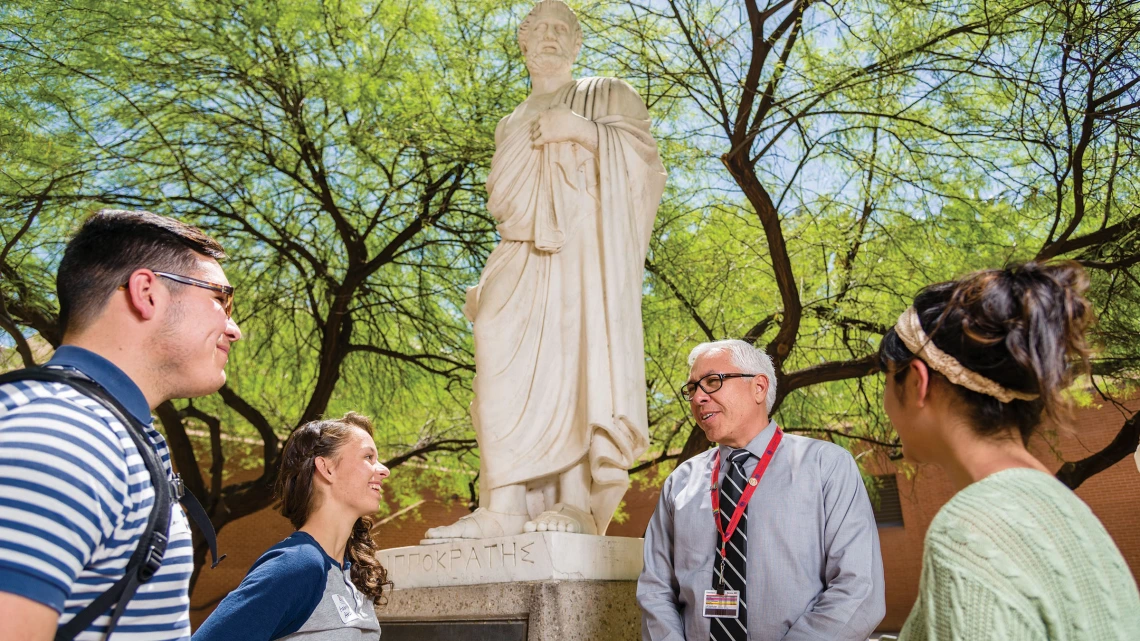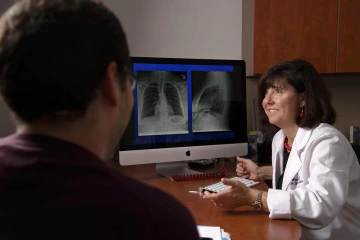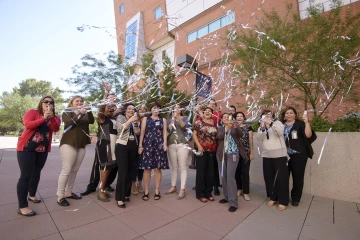All of Us: Diversity in Research Leads to Precision in Medicine
Analyzing genes and other variables can match patients to effective treatments. But the data must be representative of the entire population.

Francisco Moreno, MD, leads efforts to integrate diversity into health care and education, as University of Arizona engagement leader for All of Us and Health Sciences associate vice president of equity, diversity and inclusion.
Our genes are what make us unique and can influence how we react to pharmaceuticals, explaining why some people respond well to a drug treatment while others don’t get much benefit at all. In recent years, the concept of precision medicine has applied this knowledge to patient care.
“It’s an approach to make sure a patient is getting the appropriate treatment for that person at the appropriate time,” said Monica Kraft, MD, professor at the University of Arizona College of Medicine – Tucson and chair of the Department of Medicine.
The University of Arizona Health Sciences has developed an increased focus on precision medicine, recognizing that research must include data from diverse populations. As part of this effort, in 2016 the university and Banner Health joined the All of Us Research Program spearheaded by the National Institutes of Health (NIH). It aims to enroll at least 1 million volunteers nationwide to create the largest, most diverse datasets for precision health research.
What’s at stake?
“For a long time, males in Europe and the United States were the main contributors of the data we use to inform the care of everybody in the world,” said Francisco Moreno, MD, Health Sciences associate vice president of equity, diversity and inclusion and a professor of psychiatry at the College of Medicine – Tucson, “but the knowledge we gain from studying one single group does not necessarily apply to everybody else.”

Monica Kraft, MD, says the ability to recruit diverse participants is one of the university’s strengths.
But it turned out those studies were conducted with primarily white subjects, and subsequent studies revealed that Asian patients with the “short” version of the gene were less likely to get depressed and responded better to SSRIs. Doctors could use this knowledge to guide depression treatment decisions.
Diversity makes for robust data
“We don’t always have underrepresented minorities participating in trials in the numbers we’d like to see. If you want your findings to apply to a community, you have to study that community,” said Dr. Kraft, who leads All of Us at UArizona Health Sciences in partnership with Banner Health. “You can’t do it without diversity.”
All of Us volunteers are asked to fill out online surveys about lifestyle and potential environmental exposures. Additional data from electronic health records offer useful information related to medical histories, side effects and treatment effectiveness.
Some participants give blood and urine samples to provide information about genetics and biomarkers, and have basic physical measurements taken, such as height and weight. By finding associations between these different variables, researchers hope to learn more about how individuals are at risk for disease and how they respond to treatments.
Dr. Kraft, who studies severe asthma, says many chronic diseases have subtypes, each of which is driven by different biological pathways. When health care providers know which pathway is at the root of a patient’s condition, they can choose an appropriate treatment.
“In my world, if we know that a certain biological pathway is prominent in that patient, we can give them the right therapy, but to know that you’ve got to pull these pieces together,” Dr. Kraft said. “All of Us is going to allow us to move ahead, because we’re going to have all those pieces.”
Building trust with historically underrepresented communities
“Many of us see research as something that other people do. This is something that is for us, and it should be done by us.”Francisco Moreno, MD, Health Sciences associate vice president of equity, diversity and inclusion
To build a diverse dataset, researchers must engage with numerous communities that may have previously been left out of medical research. As a multiple principal investigator for All of Us and the program’s engagement leader in Arizona, Dr. Moreno favors a “shared process” that allows his team to work with others to build trust with historically marginalized groups.
His team builds nation-to-nation partnerships with Arizona’s Native American communities to uphold tribal sovereignty and acknowledge cultural sensitivities, for example by ensuring respectful handling of tissue samples in accordance with beliefs about putting a person’s body to rest after death. They also collaborate with organizations such as Chicanos Por La Causa or the Southern Arizona AIDS Foundation to strengthen ties with the Latinx and LGBTQ+ communities, bringing them to the table to ensure the research will benefit them.
“This research is being done to return value to all participants and all members of those communities,” Dr. Moreno said. “We have selected sites for recruitment where there may be more of the diversity we’re looking to work with. We have hired personnel who are representatives from those communities. Members of our participant engagement board make sure the research will address the needs of that community as opposed to just enriching the sample so we can say it’s representative.”
Tapping into Arizona’s diversity
Dr. Kraft, who recently was named contact principal investigator for All of Us, has been involved in the program since nearly the beginning, and is herself enrolled as a participant. In her role as PI, she oversees the largest NIH peer-reviewed grant the University of Arizona Health Sciences has ever received — more than $12 million annually.

In October 2017, the All of Us team at the University of Arizona celebrated enrolling their 1,000th participant.
"We were one of the first four sites to receive this grant,” Dr. Kraft said. “One of the reasons we received this grant is because Banner’s reach is as far as it is. We have recruited the largest number of participants from underrepresented minority groups. I’m very proud of that.”
For Dr. Moreno, All of Us brings his interests in science and advocacy together. He hopes the greater attention given to recruiting people from diverse backgrounds will fuel medical advances that help everybody, and believes the university’s location provides All of Us access to unique demographics.
“Arizona offers multiple elements of diversity,” Dr. Moreno said. “We have racial and ethnic diversity. We have people who live in rural areas, people who live in border communities and tribal nations.”
So far, nearly 40,000 participants have been recruited through University of Arizona and Banner alone, out of a nationwide total of 350,000. Any resident of the United States 18 years of age or older can join them by enrolling in All of Us.
“Every member of the University of Arizona should consider their personal opportunity to contribute to the advancement of science,” Dr. Moreno said. “Many of us see research as something that other people do. This is something that is for us, and it should be done by us.”
If you are interested in enrolling or learning more about the All of Us Research Program in Tucson, Phoenix or Nogales, please call 1-877-268-2684 or visit www.AllofUsAZ.org.

